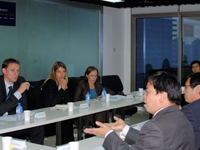Registration
You will receive an email confirming your registration.
IMGXYZ2798IMGZYXThe Carnegie-Tsinghua Center for Global Policy hosted a delegation from the European Commission’s Directorate General for Trade for a roundtable discussion with U.S. and Chinese scholars on the state of the Chinese economy and Sino-EU trade relations. Carnegie’s Paul Haenle moderated the event.
The European Commission delegation was led by Helena König, head of the Commission's Directorate General for Trade’s unit on trade relations with the Far East. Her delegation included Marianne Gumaelius, head of the trade and investment section, and Filip Deraedt, who works on trade relations with China for the unit. The Chinese scholars included Dr. Shi Zhiqin and Dr. Zhao Kejin, Carnegie-Tsinghua resident scholars; Professor Xia Youfu of the University of Business and Economics; and Dr. Pang Zhongying, director of the Center for Global Governance, People’s University. U.S. participants included Carnegie’s Michael Pettis and William Adams, a resident economist at the Conference Board in China Center for Economics.
Economic Tensions
Participants discussed some of the numerous economic and trade issues between the European Union and China that have been causing tensions in the bilateral relationship.
- Protectionism: In the wake of the Great Recession and the euro crisis, protectionist rhetoric is on the rise. Participants expressed their concern that protectionist legislation, intended to bolster domestic economies, could quickly lead to a trade war that would hurt both trade surplus and trade deficit nations, and damage global political relations.
- Intellectual Property Rights: Intellectual property rights have been an issue of increasing tension between the European Union and China. Beijing aims to import more high-tech products from the EU. However, without satisfactory protection on intellectual property rights, the EU has been hesitant to export those products to China even though the demand exists.
- Exchange Rates: Global tensions over currency rates are rising, as the EU has recently joined calls by the United States for China to revalue its currency. Participants discussed how revaluing the currency could affect the Chinese domestic economy and the potential negative global consequences if China were to revalue the renminbi too quickly.
- Market Accessibility: Participants also spoke about Chinese market access to the EU and vice versa. They agreed that measures have to be taken to allow foreign businesses better access to domestic markets on both sides.
The discussion also touched on the state of the economy in China, Europe’s arms embargo, and global investment.
China and the International Community
The participants agreed that China’s relationship with Europe is an important one, especially since China is trying to diversify its relations with the world.
- Shared Interests: China and Europe share common interests on major international and regional issues, such as coping with the global financial crisis and climate change. Enhanced China-Europe cooperation is beneficial to both sides, and would be valuable for promoting global stability and development
- China’s Diversification: China has an interest in diversifying its relationship with the West. While Beijing is currently working on developing a healthy and stable Sino-U.S. bilateral relationship, China also needs to put more emphasis on having a more diversified diplomacy with other powers. A stronger China-EU relationship would also provide China with more flexibility in the international arena.
The participants agreed that two parties should work together to promote EU-China trade relations as a good global model against protectionism.
Discussants: William Adams, Xia Youfu, Pang Zhongying
